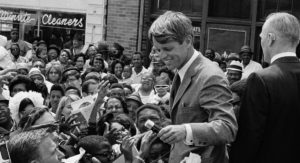A gunman changed the course of American political history. Dammit, anyhow!
We are left 50 years since that terrible day to wonder what might have occurred had the shooter missed, or had a presidential candidate taken another route from a hotel ballroom to his next stop.
Robert F. Kennedy had just won the California Democratic presidential primary on June 4, 1968. A few minutes after midnight, he spoke to a crowded Los Angeles hotel ballroom. He said, “On to Chicago and let’s win there.”
He didn’t make it to Chicago. Sirhan B. Sirhan shot Sen. Kennedy, inflicting a mortal wound not just on one man, but on the hearts of millions of Americans who had hope that this individual could change the direction of a nation at war with itself over the conduct of a conflict in a place called Vietnam.
RFK spoke uniquely to a nation that had just endured the murder of Martin Luther King Jr., and watched as its young warriors were dying daily on battlefields in Vietnam with no clear strategy to bring that war to an end.
I have my own Bobby Kennedy story. I’ve told it before. I want to restate it here, but with a twist.
A week before he died, RFK was campaigning in my home state of Oregon. He would lose the Oregon primary to Sen. Eugene McCarthy. On the last night of that campaign, Sen. Kennedy showed up at a tony Chinese restaurant next door to where I was working.
I saw his profile back-lit by a parking lot light, grabbed a pen and a piece of adding-machine paper and ran across to where he stood with his wife, Ethel. I walked up to Sen. Kennedy, thrust the paper and pen toward him. He signed it “RF Kennedy,” and handed the piece of paper back.
Then he asked, “Are you old enough to vote?” Stupid me. I didn’t have the presence of mind to lie at that moment. I wasn’t old enough to vote; the voting age was 21 in 1968. I should have said “yes.” I should have equivocated somehow, perhaps by telling him I would be old enough to vote in 1972.
I didn’t. I said, “No, I am not. I just want to wish you well, senator.”
Bobby’s response? He turned around and walked into the restaurant. He didn’t say another word to me. It was as if I no longer mattered to him.
Well …
Did that single act make me admire him less? Did I lose hope that he could change the nation’s political course? No on both counts.
One week later, he was gone.
A little more than two months after that, I reported for duty in the U.S. Army. My journey would take me to Vietnam, where I got a brief up-close look at the war that had torn the nation apart and given Robert Francis Kennedy a reason to seek the presidency.
This will be a difficult week for me as TV networks will broadcast remembrances of what might have occurred had fate not intervened.
I am likely to weep without shame.
